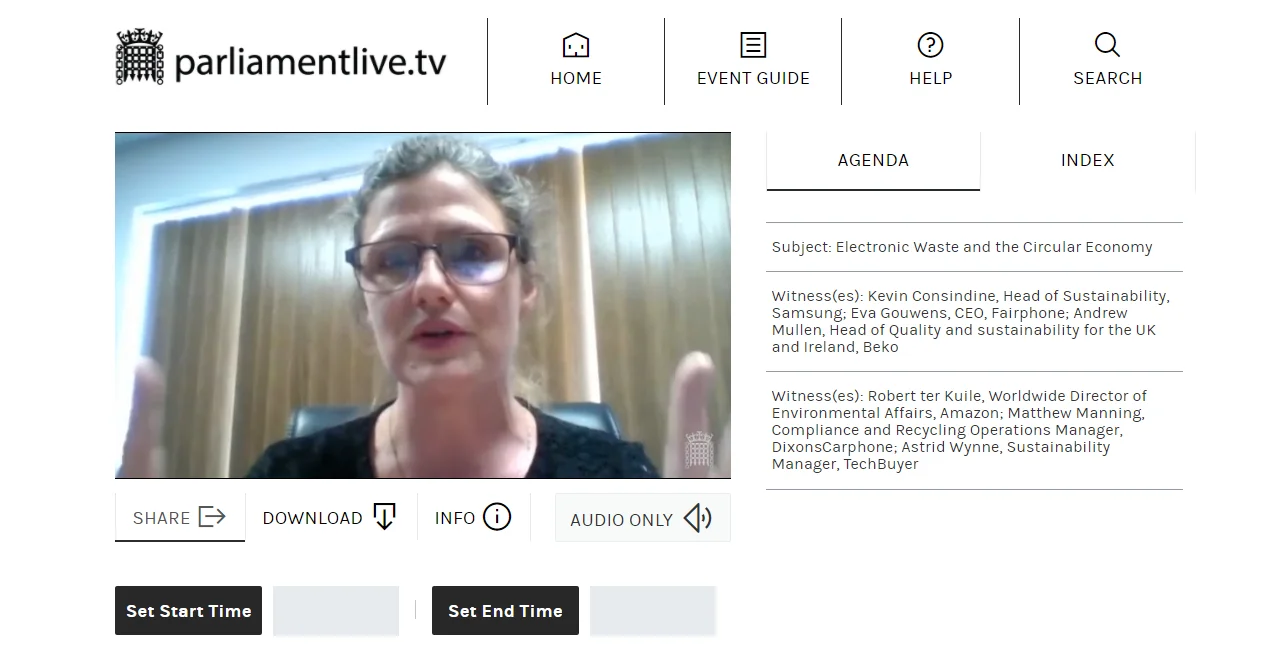Supporting Government moves towards zero carbon
Astrid Wynne | Dec. 10, 2020

In July 2020, I was in the privileged position to provide oral evidence to the Environmental Audit Committee in Westminster for the enquiry into electronic waste and the circular economy.
Having spent three years pulling apart data on the material and carbon cost of servers, it was a chance to be a part of a movement towards becoming better stewards of the materials in our hands. That seems really important given the rise in data usage – with associated server/CPU production – and the material cost that represents. Servers take an astonishing amount of carbon to produce – up to 1750kg per unit according to some manufacturer estimations. They also contain a significant amount of precious metals and non-recyclable elements that are in critically low supply, like rare earth elements, antimony and cobalt. With only 10-15% of the server estate recycled (and 120m new units between 2019-2023), finding more circular solutions for that hardware is imperative. Even more so since there is likely to be a 500% increase in data centres between now and 2030.
Part of my job is to understand and communicate what a take, make, waste approach to IT hardware will cost in the long run. Our increasingly digitalised society is looking to data collection and transfer to solve the world’s ills, whether that be AI to optimise crop productiveness or smart cars that enable shared transport. However, if we are going to build this low carbon utopia, we need to have the materials to build it. That will mean taking better care of the rare earths and precious metals in the IT hardware, because the mines are not inexhaustible.
Getting answers on what the IT hardware costs us is not as easy as it might appear. Complex supply chains from multiple tiny players feed the manufacturers which produce our ICT. It is an intricately detailed landscape in which to measure exactly what quantity of which material is in our hardware, with knock on effects for how to reduce the impact of this.
For this reason, another large part of my job has been supporting research into this, facilitating equipment and support to projects trying to analyse the material content of servers so we can look at optimising this long term. However, in amongst all this is the much more immediate threat of climate change. Put simply, if we can not find a way of halting the temperature rise to 1.5%, it really does not matter how long the mines will last… because we are going to have far bigger problems.
I first became involved with the project that became Interact for the “materialistic” reasons. Having made the case for refurbishment and circular approaches for a while, I wanted to know how that played with energy efficiency. In broad terms, I wanted to know if carbon savings on the energy bill could be balanced against the carbon savings of avoiding manufacturing new equipment. However, work with the local Climate Change Coalition, the Data Centre Alliance and, most importantly our lead academic, has changed all that.
Watching successive waves of legislation and policy coming through has pointed to a real need to change the way we measure and run our systems. Governments appear to be lacking details on particular niche sectors, and that is where industry expertise can help.
This November, the Environmental Audit Committee published its report on the enquiry I submitted evidence to, which recommended that the right to repair should be enshrined in law and that there should be a VAT reduction on repaired equipment. The report called for a halt of illegal shipment of electronic waste overseas where it causes toxic damage to people and environment and said that collection services should be mandated for online retailers by the end of 2021.
Although the focus was on the consumer side, all of the above can and should apply to businesses. With correct component level upgrades and evidence based decisions made on which machines to use for upgrade, data centres can make a real difference to the amount of electronic waste generated. As experts in data processing and data transfer the sector is expected to demonstrate and promote best practice.